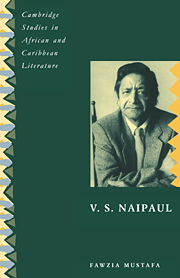1 - Introduction
Published online by Cambridge University Press: 06 January 2010
Summary
Look, boys, it ever strike you that the world not real at all? It ever strike you that we have the only mind in the world and you just thinking up everything else?
(V.S. Naipaul, Miguel Street)Few non-western twentieth-century writers of English have gained a readership as extensive and various as V.S. Naipaul. Few have been as prolific in both the genres of fiction and non-fiction and managed to develop and sustain such a singular expressive and literary idiom. At the present time, perhaps the most evident of the several features that distinguish this idiom is its longevity. Readers continue to be surprised at recognizing the same personae, voices, and narrative stances, introduced nearly forty years ago, surfacing with the same nervous energy, in each newly published work. This longevity, however, does not reside in the persistence of Naipaul's narrative tactics alone; instead, it is their combination with the consistency of what Naipaul writes about, primarily Third-World subjects, that gives a particular resilience to his expressions. For those readers unfamiliar with the places and situations Naipaul's work has explored, his career takes on an aura of a mission whose goal has been to find a way to make one part of the world readable to another. Conversely, for those readers who are familiar with the Third-World issues Naipaul has continued to address, his habits of representation appear to be increasingly made up of misperceptions and inappropriate inquiries.
- Type
- Chapter
- Information
- V. S. Naipaul , pp. 1 - 29Publisher: Cambridge University PressPrint publication year: 1995



